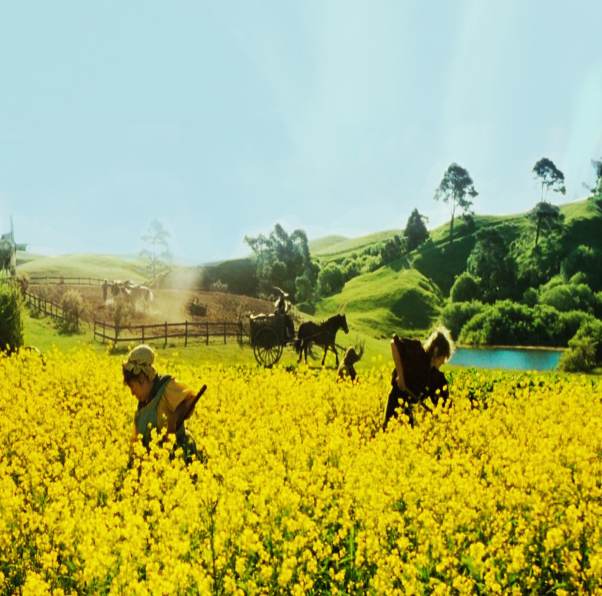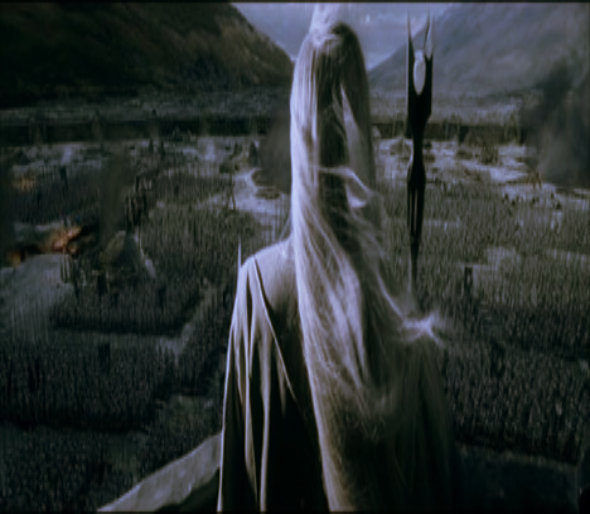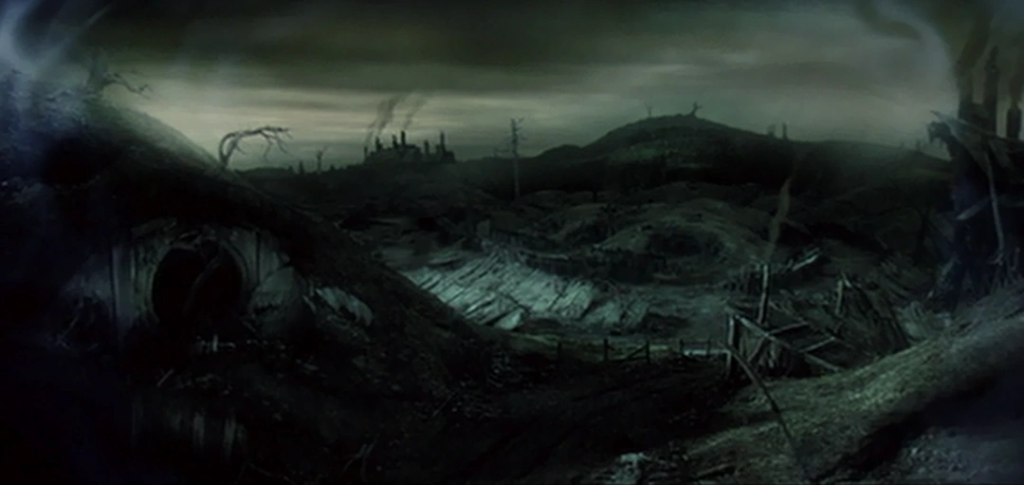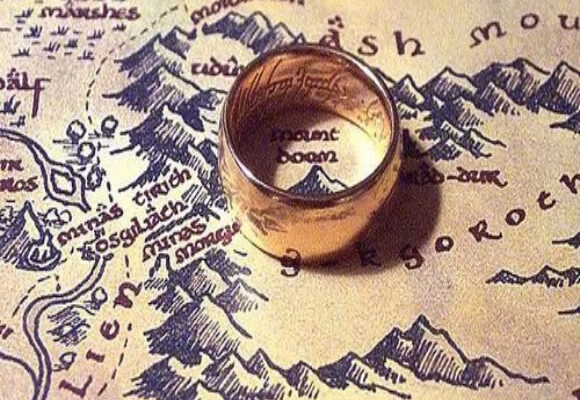Two areas I have studied that have fascinated me are the Old South and author J.R.R. Tolkien and his creation of Middle-earth. Examining both, I found remarkable similarities in their portrayals of good and evil, piquing my interest. It seems the “free peoples” of Middle-earth lived lifestyles and built societies similar to those which the South had, and the orcs and tyrants, such as Sauron, fit very nicely with the Southern view of the Yankees and progressives. At heart, Tolkien was, in many ways, a Southerner.
On the surface, there were differences between Tolkien and many Southerners. He was an Englishman, born after the events of the American Civil War, and was deeply in love with his land; a feudal monarchist and a devout traditionalist Catholic, while most of the South was Protestant. But the differences were not in substance, but method. Further, as I show in my book Defending Dixie’s Land, the Old South had strong aristocratic, feudal, and monarchical tendencies, a great admiration for the Middle Ages, and, in many ways, resembled a Protestant version of medieval Europe, a significant period of Professor Tolkien’s study and strong interests. Also, the South’s form of Protestantism was the “High Church,” and Catholicism played a more impactful and accepted role in the South than in the North. Traditional Catholics sided with the Old South rather than the progressive North during the Civil War due to cultural, religious, and political similarities.
In my book The Road Goes Ever On and On: A New Perspective on J. R. R. Tolkien and Middle-earth, I define Tolkien’s politics as a Christian, libertarian, feudal monarchist, or ancho-monarchist. Tolkien’s own preferences closely follow those of Anglo-Saxon England and early medieval kingship. Misinformation and falsehoods aside, the feudal Middle Ages’ Catholic monarchies provided the longest-lasting, libertarian, decentralized, self-governing societies ever known to man. Only the Old South has come close.
Tolkien despised modernity, centralized power, communism, and all forms of totalitarianism. Thus, he would have rejected the North’s push for expanding governmental powers and centralized policies. He held to traditional beliefs and regarded liberalism and intrusions into the Church, home, and families, as has become the norm, as evil.
Southerners in Middle-earth
Hobbits

Tolkien is best known as the creator of Middle-earth. His hobbits dwelt in the Shire and are perhaps his most beloved characters, reflecting who he was. Tolkien once described himself as “a Hobbit in all but size.” The hobbits represented Tolkien’s societal ideals and would seem very familiar to a Southerner.
Hobbits lived in an agrarian, libertarian society where the government’s only role was delivering the mail and supplying a few sheriffs to protect the borders and return stray animals. The community was made up of moral, close-knit extended families who passed on trades and farmlands to their descendants. Most everyone was engaged in agriculture in one way or another, usually on self-sufficient family farms while growing a cash crop to barter.
Tolkien describes the Shire, as I might the Old South, as a “half republic half aristocracy.” It was led by upstanding, respectable, gentle hobbits like Bilbo Baggins, and like in the Old South, hobbits kept to the old laws of free will. Families did almost all the governing. Tolkien tells us that, in the Shire, “Families, for the most part, managed their own affairs” where “many generations of relatives lived in (comparative) peace together in one ancestral and many tunneled mansion. All hobbits were, in any case, clannish.” The Shire was broken down into many subdivisions based on these leading families; in other words, decentralization as they would not force themselves on others (as Yankees do).
Hobbits were slow to change and held onto traditions. “I can’t abide changes,” said Old Gamgee. They were also in no hurry. Describing the Southerner, Avirett writes:
“As there was no hurry among us in those days, no need of haste, men took time to be truly conservative and fastened the taproot of their every-day life deep down into the soil which was pressed by the foot-prints of George Washington, Jefferson, Madison, Monroe, Henry, and such others as gave dignity and honor to American citizenship.”
James Battle Avirett, The Old Plantation How We Lived in Great House and Cabin Before the War, F. Tennyson Neely Co. New York Chicago London, 1901
Hobbits enjoyed leisure. Perhaps the best-known hobbit, Bilbo, tells the wizard Gandalf, “There is no hurry. We have all the day before us.” They could be described by the word “contented.” They spent most of their time growing food and eating it and were also known for smoking a pipe, drinking a few beers, writing, thinking, singing, fishing, walks in nature, gardening, and other similar pursuits. They were “plain folk” who were not in a hurry to “progress.” Their enjoyment of tobacco [the number one export] and beer might not sit well with the Puritan-minded Yankee.
Pursuing money, industry, and materialism (like the North) holds no sway over hobbits. On his deathbed, the treasure and money-focused dwarf, Thorin Oakenshield, admits to Bilbo, “If more of us valued food and cheer and song above hoarded gold, it would be a merrier world.”
Kingship
Throughout the several diverse realms of the free people, many similarities distinct from the evil territory under the “Shadow” are displayed: honor, family ties, freedom, morality, and a love for the environment, and more, seen as the artwork of the creator god (Eru) of Middle-earth.
They were followers of Eru’s (the god and creator of Middle-earth) design. They did not use force or numerical superiority to impose their way on others, as the North did to the South. Rather, they allowed each realm to live autonomously under their own customs and laws, similar to how the Old South wanted each section of the Union, via states’ rights, to conduct their own affairs unhindered by majorities, more powerful militaries, or distant politicians.
Aragorn, the heir of Elendil, rightful heir to the throne of Gondor, is given as an example of an ideal king, ruling and judging his kingdom with wisdom. He allows self-rule to certain peoples who are under his authority and protection. Rulers did not lord it over their people, coerce them, or burden them with taxes and regulations. Within the free peoples’ realms, there are no states enacting legislation to control the people. The lords allow maximum free will and liberty to those living in their realm.
Despite the vast territory under his authority, Aragorn practiced decentralization. The Shire was given full autonomy, as well as a gift of land from Aragorn. Faramir was given Ithilien to rule as his princedom. To the Ents, Aragorn gave the valley surrounding Orthanc and more land west of the mountains to allow expansion of their forest.
Dwarves, elves, hobbits, and men are allowed to maintain their own cultures without the need or desire to control any other. Treebeard, leader of Fangorn Forest, says to Celeborn the lord of Lórien whose lands border it, “I know mine, and you know yours. Let neither side molest what is the other’s.” Even when various groups live in the same areas, they respect and practice self-governance.
For example, in what is described as an excellent situation in the town of Bree, hobbits, men, dwarves, and elves all pass through or live in peace. Men are the most numerous and govern Bree, yet the hobbits who also dwell there do so, “minding their own affairs in their own ways.” And Bree itself, like so many of the trade towns in medieval Europe, is entirely autonomous; the men of Bree are described as “independent; they belonged to nobody but themselves.” The practice of self-government cultivated contentment and happiness. Mr. Butterbur said he would not leave Bree for any money. In and around Lake-town, Dale, Erebor, and the Woodland Realm, dwarves, men, and elves live in peace, alliance, and friendship. The men of Dale and Lake-town apprentice their sons to the dwarves of Erebor, renowned for their crafting abilities. When the Easterlings attacked the region during the War of the Ring, the dwarves allied with and fought alongside the men of Dale and their king Brand, grandson of Bard who had killed the dragon Smaug in The Hobbit.
Within the realm of Rohan, we also see a decentralized form of ruling. Rohan has its king and lords, including the three marshals of the Mark, who govern within Rohan with their own capitals of Helm’s Deep, Aldburg, and Edoras. Éomer said, “The East Mark is my charge, the ward of the third marshal.” King Théoden’s son, Théodred (killed at the battle of Isen), was the second marshal of the Mark and his capital was at Helm’s Deep. King Théoden himself was the first of these marshals, and he relied on his vassals, who willingly sent men to his aid. Like Anglo-Saxon England, the king’s army comprised a minimal number of professional soldiers – the king had to call on his vassals for a muster as Theoden did. The majority of “soldiers” were full-time farmers who loyally served their local lords, who, in turn, served the king. Outside the gates of Edoras, we encounter other lesser lords of the house of Eorl, such as Dúnhere, the lord of Harrowdale. The men of Rohan are identified by their home regions, an example of which is “the men of the Westfold.” Their local lord is Erkenbrand, who rules and commands independently of Edoras. When the men of Rohan are killed in battle, they are buried separately by place of birth; for example, the men of the Westfold were buried separately from the men of the East Dales (similar to how the Confederacy raised regiments by states). Rohan’s libertarian politics are summed up by Éomer, when he states, “We desire only to be free, and to live as we have lived, keeping our own, and serving no foreign lord, good or evil.” (Think Abraham Lincoln.)
Yankees in Middle-earth

“The story is cast in terms of a good side, and a bad side, beauty against ruthless ugliness, tyranny against Kingship, moderated freedom with consent against compulsion.”
J. R. R. Tolkien, “Letter 144”
Sauron rejected god (Eru Ilúvatar) and wanted his followers to be atheists, so they would treat him as god with no resistance. He hated and destroyed the environment because he only ever saw and desired power and control. He only valued it for what he could get out of it. Further, his hatred of god made him angry to see the beauty of the designer; he wanted wasteland and destruction. Likewise, he despised creations of god such as men, ents, hobbit sane elves and so waged war to destroy them.
Peace and self-governance were not to be found in the realms ruled by the tyrannical Sauron, nor his own prior master Morgoth, or the fallen wizard Saruman. They all operated using a highly centralized form of government driven by fear, power, and control. There was no law nor any ancient customs in Mordor. Sauron was the law. His dictates, his desires, and what he declared was law. Sauron’s orcs had nothing to protect them; they were only tools to an end.
The free people are superior individual fighters, fighting for a good cause and defending their homeland. However, like Northern armies, full of mercenaries and perhaps less incentive, the Shadow has endless numbers and sends wave after wave against the free people, driven only by fear of Sauron.
The Shadow’s forces operated like modern totalitarian states, with the government controlling the realm in a highly centralized way to benefit the supreme tyrant. Any disobedience was punished, and countered with force, much as the invaded Southern states discovered.
Any tyrant who seeks centralization wants complete control. Sauron wanted the whole earth under his domain. Robert E. Lee warned as follows about what would occur if the United States was to centralize:
“The consolidation of the states into one vast empire, sure to be aggressive abroad and despotic at home, will be the certain precursor of ruin which has overwhelmed all that preceded it.”
The clearest symbols of power and control offered by Tolkien are the Rings of Power crafted in the Second Age, with the aid of the Dark Lord Sauron. His ultimate purpose was to bring all the free peoples under his dominion through the One Ring, secretly made in Mordor, “one ring to rule them all.” Sauron, who fashioned the Ring and infused it with evil, knew its true purpose. He would use the Ring’s power to increase his might, to wage war against, overwhelm, and enslave the free peoples. That was his only intention, absolute domination. That is why he made the Ring, “forged secretly in the mountains of fire, The One Ring to be their master.”
Destruction of the Shire

The scourging of the Shire in many ways resembles the American Civil War. At the end of The Lord of the Rings, the Shire has been invaded by outside forces that transformed the Shire’s government. These invaders bring socialism, industry, and moral decay. The new government ignored all the old laws and traditions, instituting a multitude of oppressive ones of their own. These laws all limited the liberty of the hobbits and expanded the power of the state.
New laws are continuously passed to govern business, lay taxes on exports, limit free speech, regulate housing, and then expand the police state to enforce them. These laws destroy commerce, and many businesses are eventually forced to shut down. Substances are deemed illegal (beer and pipeweed are confiscated), and subsidized industrial factories replace independent farms. Now, hobbits must work for the government through a collaboration with local industrial businesses. Taxation and regulation force the formerly leisurely agrarian hobbits to give up the farm and work as laborers in a hurried industrial setting where the profit is then used to benefit those in power colluding with the industrialist. “Gatherers and sharers” are sent around to collect the hobbit’s earnings “for fair redistribution.” But, in reality, it just relocates to the pockets of the new industrialist and those in power. Like the Master of Lake-town, Yankees and those who scour the Shire, are just known as money-grubbers.
The new centralized government’s factories pollute the water, air, and land, destroying the Shire’s beauty. The government gobbles up private property, with no one left to care for and love their local farms and the land’s beauty. Hobbits and their land have become but a means to grow the resources and power for the new socialist government.

Jeb Smith is the author of four books, the most recent being Missing Monarchy: Correcting Misconceptions About The Middle Ages, Medieval Kingship, Democracy, And Liberty. Before that, he published The Road Goes Ever On and On: A New Perspective on J. R. R. Tolkien and Middle-earth and also authored Defending Dixie’s Land: What Every American Should Know About The South And The Civil War, written under the name Isaac C. Bishop. Smith has authored dozens of articles in various publications, including History is Now Magazine, The Postil Magazine, Medieval History, Medieval Magazine, and Fellowship & Fairydust and featured on various podcasts including The Lepanto Institute.






I loved your inclusion of the Lee quote. It put me in mind of Washington’s 1796 Farewell Address which is downright prophetic as regards U.S. support of “their greatest ally” (i.e. parasite) and consequent alienation of the Arab world.
Somewhat off point, but has anyone read Mike King’s “Dixieland Deceived”? I haven’t, but am interested in hearing the thoughts of those who may have read or reviewed it. I’m sure the international banksters, and guys like Albert Pike, were not idle before or during the war, but the idea that Lincoln was a hero that opposed them, is refuted by everything I know about his collusion with reprobates like Thaddeus Stevens, the railroad interests, etc.
I have not read DD but thank you for notifying me of it, and I am glad you enjoyed the Lee quote!
German Confederate and
Jeb Smith.
U.S Grant’s military post was on the Columbia river, protecting a Dutch east India trading fort, before the war of Northern aggression.
The book Uncle Tom’s cabin came out in 1852, it was a bestseller, i have read that a book called ‘Maria Monk’ (about a woman who sexually serviced the Catholic priests) was the number 2 best seller.
More than 300,000 copies were sold by the time of the civil war. I have just read that at the encyclepia britanica and also NY Protestant agitators pushed this book through to an U.S audience. The author was Maria Monk and she was from western Canada. The ‘uncle Tom’s cabin’ book was number one for 30 years. Lincoln said to the author of the book ‘uncle Tom’s cabin’, that it was one of the reasons for the civil war.
Thank you for the thought provoking and enlightening article and commentary.
God Bless You
Edit:
I swear the book i had read said that Grant protected a Dutch east India trading post, I looked into it again and found out that he was stationed at an Hudson bay company fort before Fort Vancouver was built.
My Brother read me the Hobbit when I was a child,
I own most of J.R.R Tolkien works.
Fascinating read,
Thanks!
Have you read Unfinished Tales? If not, I highly recommend it.
And thank you.
I have it in my Library, in a special place, reading the The Art of War at this time and focusing on my Article for I.D. The quiet revolution of Quebec,
Would like to connect it to Cajun country of the south so many angles to take!
Very thankful for being asked to write an article for this site, hope it makes the cut with editing staff.
God Blesd Dixie
Your welcome Sir
Dang! Now I’m going to have to read Lord of the Rings….
LOL, I LOVE it!
Not to burden you but the letters of J.R.R Tolkien and his authorized biography by Humphreys Carpenter will help you view Middle-earth through the lens of its creator releasing some of the content I have been speaking of.
To destroy the centralizing evil, provoked into action, very common Hobbits attacked the enemy, killed them, and restored order.
To German Confederate:
I read Mike King’s DD. He argues that Jewish bankers and freemasons badly wanted the Civil War so America would be fractured and having two different bodies of land would be easier to control and be profitable for them. He has good information on Judah Benjamin and his influence in the South and obliterates John C Calhoun being a globalist shill. Of course he completely ignores the war atrocities committed by the North and tries to validate (unsuccessfully) Lincoln asking like a tyrant. Overall, it’s an interesting read but his lack of legitimate sources and his picking & choosing of history is concerning.
Thanks Intrepid. That’s kind of what I expected, but I ordered a copy to read it because it’s being touted by the Barnes Review.
I’ve read of how Judah Benjamin may have made off with the Confederate gold at war’s end, and that sounds feasible. The Divide and Conquer scenario also sounds plausible, but it’s hard to believe that the agrarian South’s constituents would have bought into such a mercantilist scheme. Besides (regardless of what he says) a Union victory by Lincoln was really just what globalists ordered as it has played out. It all could have been avoided if the Lincoln admin had just let the South go.
Gerard Menuhin (Tell the Truth and Shame the Devil) has an interesting comment on the effects of the National Banking Act of 1863 which Lincoln allowed to pass because he needed greenbacks to finance the war. The old plan of State Banks became passe, and it gave the National Banks an almost absolute control of the National finance. It was a perfect incremental step towards the Federal Reserve Act of 1913.
Thanks for the reply.
Hello German Confederate, great commentary.
I just got a hold of John Denver’s ‘The Classic Christmas Album’ one of the songs is called ‘Noel: Christmas eve 1913’ the songs original debut came out in 1979 on ‘a Christmas together, John Denver and the muppets’ Album, I wonder if John Denver knew that the federal reserve act was snuck through Congress at midnight on Christmas eve, 1913. Lee Holdridge wrote the song. I just read the lyrics, they are the polar opposite of the noose put around the U.S.s neck on Christmas Eve 1913 with the “federal” reserve. So much for my John Denver Christmas! Kinda creepy.
God Bless you Sir.
Thanks Outside Looking In.
This article’s comments will soon close so I hope you’ll get this comment and link. CHRISTIANITY APPLIED is a site you may really like. This article shows that not all the Puritans were avaricious moneygrubbing capitalists. Much is made of the Whitehall Conference and Cromwell’s proposal to Parliament for readmission of the Jews to England, but Puritan William Prynne vehemently opposed it. From what I’m learning, many of them (like Cromwell) were postmillennial in their eschatology and believed there was to be a calling and salvation of the Jews before Christ returns. It clouded their judgment otherwise in fatal ways. I’ve ordered a copy of Prynne’s book from TBR and look forward to further discoveries.
https://www.christianityapplied.org/cromwell-whitehall-readmission-jews-england/
I would Love to read that book!
Thank you for the site too.
It seems to me that the Trump faithful are a remnant of the puritans.
Who runs barter town!.
Here’s a book I told you about on a previous thread, I finally dug it out.
‘The bitter harvest’ Church and State in Northern Ireland
Albert J. Menendez 1973
It has a piece of literature in the back pages that the Puritan press put out in Britain and they qoute Adolph Hitler from a book called ‘Hitler speaks’ by Hermann Rausching, are you familiar with that book?
Hopefully the comments won’t close on us.
David Irving points out that the Hermann Rauschning book is fraudulent. It’s quoted widely by those who desire to smear the Fuhrer and the Reich with atrocity falsehoods, so I hope that’s no reflection on the truths of the Menendez book you mention, but Rauschning IN FACT only had a passing acquaintance with Hitler and was by no means the intimate he claims. Part of the ‘denazification’ process in postwar Germany involved the Allies paying large sums of money to anyone who would write sensational fictions about National Socialism that fit their “evil monsters” narrative. Thanks for the book recommendation. I’ll check it out.
‘The truths of the Menendez book that you mention’
The book is about Irish Catholic and Irish protestants in Northern Ireland and their fueds.
I didn’t want to qoute a book I was unfamiliar with, Thank you for the reply, the author makes it clear that it is propaganda from the puritan press, I just wondered if the Adolph Hitler qoute was believable, for example, ‘the protestants haven’t the faintest conception of a church……..’ AH.
I have a picture on my wall of Hitler and a German Catholic nun, he is signing his autograph for her, the truth is, the Catholic Hapsburgs selling out to the Jews (king John the fourth of Portugal 1648) shortly before Cromwells parliamentary inquiry into letting the jews back into England, (that you just shared with me) left the whole Catholic order to rot on the vine in the New world, and ultimately Europe, there is no greater justice, in my opinion, for those German Nuns that went into the jungles of central and South America for Jesus Christ, than a father protector of his people found in Adolph Hitler.
Thank you again for your reply and insight.
God Bless You Sir